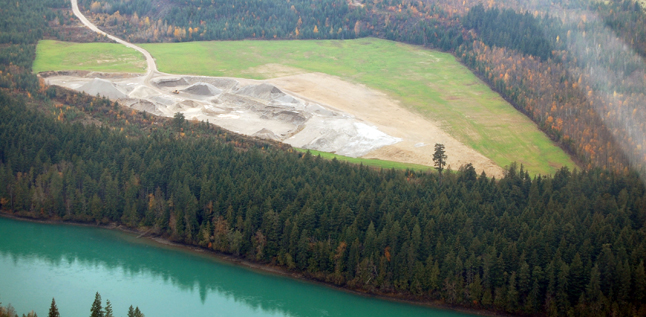
By David F. Rooney
There’s more to the gravel at the Westside Gravel Pit than meets the eye. Not only is it 75.8 per cent silicon dioxide, but it contains minerals that are known carcinogens and toxins, including arsenic, cadmium, strontium and cesium.
A report prepared for Interoute, the company that owns the controversial pit, by Acme Labs on August 30, said 75.8 per cent of the material in the pit consists of silicon dioxide from alpha quartz, cristobalite and tridymite. According to the International Agency for Research on Cancer, crystalline silica dust is a known human carcinogen (http://www.ncbi.nlm.nih.gov/pmc/articles/PMC1470097/).
The report also said 10.7 % of the material in the Westside gravel pit consists of aluminum oxide. This material has been linked to Alzheimer’s disease and breast cancer.
The remaining minerals that make up the aggregate in the pit are: iron oxide, magnesium oxide, calcium oxide, sodium oxide, potassium oxide, titanium oxide, phosphorus pentoxide, manganese oxide, chromium oxide, nickel, scandium, barium, beryllium, cobalt, caesium, gallium, hafnium, niobium, rubidium, tin, strontium, tantalum, thorium, uranium, vanadium, tungsten, zirconium, yttrium, lanthanum, cerium, praseodymium, neodymium, samarium, europium, gadolinium, terbium, dysprosium, holmium, erbium, thulium, ytterbium, lutetium, molybdenum, copper, lead, zinc, nickel, arsenic, cadmium, antimony, bismuth, silver, gold, mercury, thallium and selenium. These minerals are present in various concentrations. (Click here to view extracts from the lab report in PDF format)
Long-term exposure to some of these minerals have been linked to a variety of cancers and respiratory illnesses.
In July, City Council asked Interoute to provide it with a chemical analysis of the material in the pit. The report was not made available to the City or to gravel pit opponent Stuart Andrews until after the Ministry of Energy, Mines and Petroleum Resources approved Interoute’s application to mine the gravel on October 15.
Local Lawyer Jody Lownds is working with Andrews on a possible legal action to avert continued mining at the site, which is planned for expansion to 120 acres over the next several years.
As far as Andrews is concerned, the lab report confirms something he has said several times during his lonely campaign to stop the mining operation.
“It’s a hazard to human health,” he said in an interview last week.
Andrews noted that the ministry has told Interoute, which does have a dust control plan in place, that it must monitor dust levels at the Westside pit and ensure their workers are protected.
“The only thing they’re concerned about is their workers’ health,” Andrews said. “They’re not concerned with the general public’s health.”
Regardless of the chemical analysis that some people may find alarming, Corey Rokosh of Valley Blacktop, the Interoute’s subsidiary responsible for the pit, told the City in an e-mail last week that gravel crushing operations will begin at the pit on Nov. 3. The crusher will operate from 7 am until 5 pm for the next six to eight weeks.
Rokosh was unavailable for comment on the chemical analysis.
Andrews also said that the ministry is continuing to refuse requests by him and Lownds for a copy of Interoute’s permit.
Lownds said she and other lawyers, including Andrew Gage of West Coast Environmental Law, are “very surprised by how difficult the ministry has been regarding the permit.” Making the permit available should be a fairly routine matter.
“We have been requesting this since October 15,” Andrews said. “I have been reduced to asking for a copy of it from the City. The City of Revelstoke have just asked for $1,350 in order for me see the documents regarding this gravel pit. They now say that there are over 500 pages of information relating to this pit. Only two months ago the City showed me a complete file regarding this pit and it was at best 50 pages.”
He has asked the City to waive the fee because the material in the permit concerned public health. The City agreed to the waiver, Andrews said.



